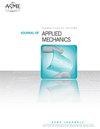静态系统微分变分方程的自动辨识
IF 2.8
4区 工程技术
Q2 MECHANICS
引用次数: 0
摘要
动态系统的数据驱动方程辨识已经取得了很大的进展,而静态系统的数据驱动方程辨识还没有跟上。与动态系统不同,静态系统是时不变的,因此我们不能沿着时间流捕获离散数据,这需要仅从稀缺数据中识别控制方程。这项工作致力于这个主题,建立一种数据驱动的方法,用于提取控制静态行为的微分变分方程,这些方程仅来自响应,负载以及系统属性值的稀缺,嘈杂数据(如果可用)。与方程辨识中通常采用的微分框架相比,微分变分框架由于其空间积分性和变异随意性,具有对数据噪声鲁棒性强、对数据量要求低等优点。通过3个连续系统和1个离散系统的数值算例,说明了该方法的应用、有效性和上述优点。本文章由计算机程序翻译,如有差异,请以英文原文为准。
Automated Identification of Differential-Variational Equations for Static Systems
Abstract Data-driven equation identification for dynamical systems has achieved great progress, which for static systems, however, has not kept pace. Unlike dynamical systems, static systems are time invariant, so we cannot capture discrete data along the time stream, which requires identifying governing equations only from scarce data. This work is devoted to this topic, building a data-driven method for extracting the differential-variational equations that govern static behaviors only from scarce, noisy data of responses, loads, as well as the values of system attributes if available. Compared to the differential framework typically adopted in equation identification, the differential-variational framework, due to its spatial integration and variation arbitrariness, brings some advantages, such as high robustness to data noise and low requirements on data amounts. The application, efficacy, and all the aforementioned advantages of this method are demonstrated by four numerical examples, including three continuous systems and one discrete system.
求助全文
通过发布文献求助,成功后即可免费获取论文全文。
去求助
来源期刊
CiteScore
4.80
自引率
3.80%
发文量
95
审稿时长
5.8 months
期刊介绍:
All areas of theoretical and applied mechanics including, but not limited to: Aerodynamics; Aeroelasticity; Biomechanics; Boundary layers; Composite materials; Computational mechanics; Constitutive modeling of materials; Dynamics; Elasticity; Experimental mechanics; Flow and fracture; Heat transport in fluid flows; Hydraulics; Impact; Internal flow; Mechanical properties of materials; Mechanics of shocks; Micromechanics; Nanomechanics; Plasticity; Stress analysis; Structures; Thermodynamics of materials and in flowing fluids; Thermo-mechanics; Turbulence; Vibration; Wave propagation

 求助内容:
求助内容: 应助结果提醒方式:
应助结果提醒方式:


